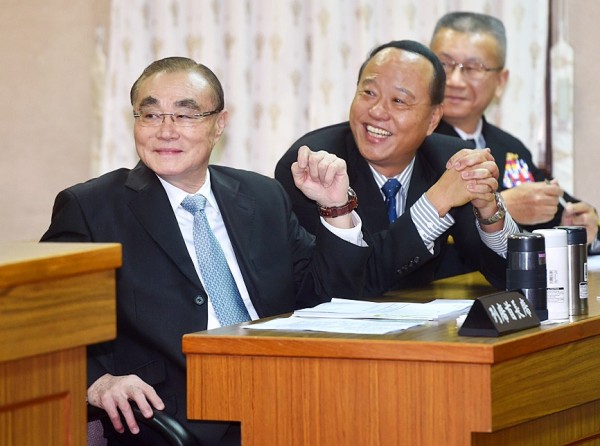《TAIPEI TIMES 焦點》 Ministry plans to obtain stealth fighter jets

Minister of National Defense Feng Shih-kuan, left, and Deputy Minister of National Defense Bo Hong-hui, center, smile during a question-and-answer session at the Legislative Yuan in Taipei yesterday. Photo: Chien Jung-fong, Taipei Times
DEFENSIVE CAPABILITIES: Defense official Chiang Chen-chung said the armed forces could defend against multiple attacks launched from bases as far as 1,300km away
By Chen Wei-han / Staff reporter
The Ministry of National Defense plans to acquire new-generation stealth fighter jets with short or vertical takeoff and landing capabilities to deter Chinese military action against Taiwan, it said in its Quadrennial Defense Review released yesterday.
The military plans to procure the jets to improve its asymmetrical capabilities, as the cross-strait military balance has increasingly tilted in China’s favor, the report said.
It also plans to develop indigenous submarines and upgrade surface vessels, improve air-defense missile and road-mobile missile systems, and establish a fleet of uncrewed aerial combat vehicles.
Any jets capable of short or vertical takeoff and landing could be the ministry’s target, including, but not exclusively, the Lockheed Martin F-35, Deputy Minister of National Defense Lee Hsi-ming (李喜明) said during a question-and-answer session at the legislature’s Foreign Affairs and National Defense Committee meeting in Taipei.
The ministry disputed reports that AGM-154 Joint Standoff Weapon systems and AGM-88 high-speed anti-radiation missiles are in an arms package for Taiwan to be approved by US President Donald Trump following his meeting with Chinese President Xi Jinping (習近平), which is scheduled for early next month in Florida.
“All those claims are media speculation,” ministry spokesman Major General Chen Chung-chi (陳中吉) said. “The nation would carefully assess [what weapons are necessary] according to regional threats and defense requirements.”
The report presents defense guidelines for a “solid defense and multi-layered deterrents,” aiming to deter the enemy from waging war and, if deterrence fails, to launch a series of counterstrikes to destroy the incoming enemy at sea or on beaches.
“With the rapid growth of China’s defense budget, the People’s Liberation Army has made considerable progress to modernize and reform its military,” the review said. “It has the ability to blockade Taiwan, launch combined operations, and seize and hold Taiwan’s outlying islands.”
Lieutenant General Chiang Chen-chung (姜振中), director of the ministry’s Office for Operations and Planning, said the armed forces have the capability to launch a counteroffensive and attack China if necessary.
Asked if the armed forces could defend against multiple attacks launched from bases as far as 1,300km from Taiwan, Chiang said the military “has such ability and there are plans and training in place.”
Legislators said the report was overwhelmingly similar to the 2013 review and the ministry had failed to clarify its plans to acquire advanced weapons or develop the local defense industry.
Democratic Progressive Party (DPP) Legislator Tsai Shih-ying (蔡適應) said there was little difference between the two reports in terms of the air force’s capabilities and cybersecurity measures.
Chinese Nationalist Party (KMT) Legislator Hsu Yu-jen (許毓仁) and DPP Legislator Chuang Jui-hsiung (莊瑞雄) said the review failed to expound on the ministry’s efforts to build a cyberwarfare command as a fourth branch of the military.
Major General Li Ting-sheng (李廷盛), director of the ministry’s Office for Communications, Electronics and Information, said that a cyberwarfare unit would be set up in the second half of this year to protect the military’s command, control, communications, computers, intelligence, surveillance and reconnaissance systems, as well as key infrastructure.
Plans to develop a local defense industry, in particular the aerospace, shipbuilding and information security sectors, is what distinguishes this year’s review from previous ones, the ministry said.
Meanwhile, Minister of National Defense Feng Shih-kuan (馮世寬) said that a small defense budget and increasing difficulty in maintaining an all-voluntary force as the nation’s birth rate declines are the biggest hurdles to improving the nation’s defensive capabilities.
Defense spending should be increased to 3 percent of the GDP, but the defense budget for this year of NT$355.7 billion (US$11.6 billion) is only 2.05 percent of GDP, Feng said.
新聞來源:TAIPEI TIMES










